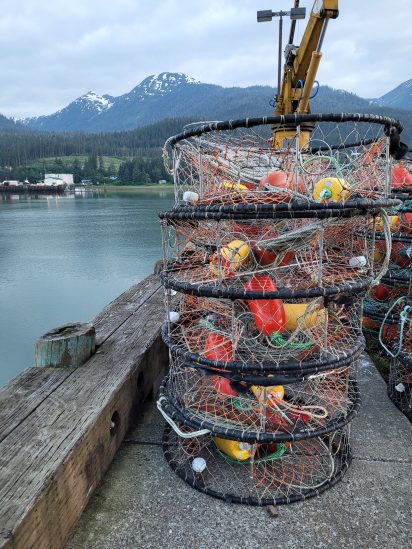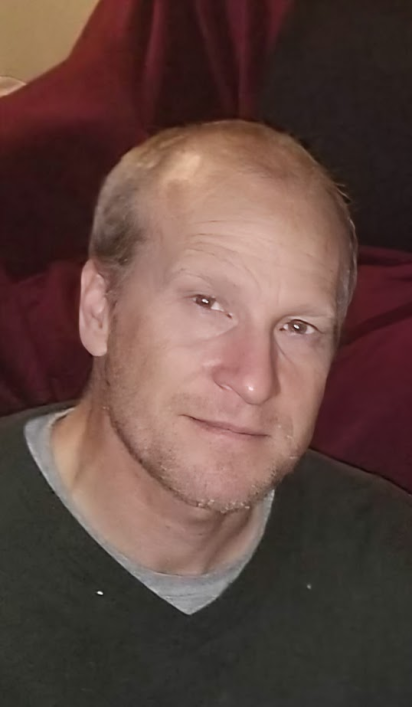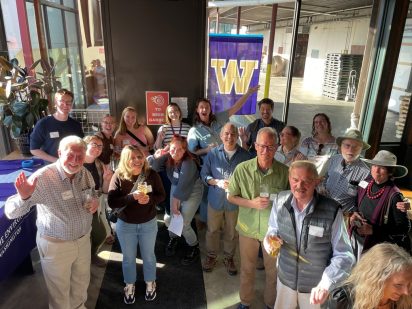
New Publication: Assessing the social-ecological dimensions of Dungeness crab fishery closures in Southeast Alaska from analysis of public records
SMEA is proud to share a new paper published in Fisheries Research titled Assessing the social-ecological dimensions of Dungeness crab fishery closures in Southeast Alaska from analysis of public records.
The study was led by SMEA alum Rondi Nordal (Class of 2024), with faculty coauthors Anne Beaudreau and Erendira Aceves-Bueno, in collaboration with NOAA colleagues.
Drawing on more than a decade of public meeting records, the research takes a deep look at how decisions about fishery closures are shaped not only by ecological goals, but also by social, cultural, and subsistence needs.

SMEA Community Reception
Heading to the Pacific Marine Expo in Seattle this November? Join us for the UW School of Marine and Environmental Affairs (SMEA) Community Reception at the Silver Cloud Hotel (Seattle Stadium location). Enjoy small bites and beverages, reconnect with old friends, make new ones, and unwind after the expo. Save-the-date. More details coming soon!
Date: Saturday, November 22, 2025
Location: Silver Cloud Hotel, (Seattle’s SODO District) 9th Floor, Avene One Ballroom
Time: 5:00 PM
Adults 21+ only—thank you for understanding!
Read more
Featured Alumnus Dan Tonnes By David Fluharty
Dan Tonnes, like many SMEA graduates with careers in the federal government or with federal funding, informed us he was leaving NOAA and federal employment after 25 years in order to take advantage of the buyout program. His premature exit from federal service has many ramifications for him, for NOAA with the loss of experience and talent, and for SMEA, as explained below.
Read moreWashed in on the Tide
What is this column?
We are experimenting with ways to engage with our alumni and to inspire current students with their accomplishments. This section is a random walk through what we’ve recently observed about or heard from alumni. Please keep Graduate Program Advisor, Tiffany L. Dion, up to date with your accomplishments and changes in location or employment. ((tlcdion@uw.edu )
Dr.

Cutting-edge Disciplinary and Interdisciplinary Research by SMEA Alumni
From monitoring humpbacks in Alaskan waters to shaping electric vehicle policy in Washington State, SMEA Alumni are actively leading and supporting cutting-edge research across environmental sectors. While their roles vary, they all share a commitment to interdisciplinary work and a passion for applied, real-world impact.
Ryan Swanson (SMEA class of 2019) is an environmental scientist at Environmental Science Associates (ESA) and conducts research for offshore infrastructure projects like tidal energy installations, fiber optic cables, and underwater battery systems.

Excavating the regulatory process and risks posed by Alaska hardrock mine expansions
A recent paper published in the journal FACETS features seven SMEA authors, titled Excavating the regulatory process and risks posed by Alaska hardrock mine expansions.
Open-access available here!
This paper represents the culmination of a SMEA capstone project! We hope it will be of interest to a broad audience, including NEPA practitioners, applied scientists, and citizens that current or future mining operations may impact.

Coastal resilience: more than just a hot topic
If you had to choose the biggest buzzword for people working in coastal management and climate-related fields over the past ten years, it might very well be ‘resilience.’ In recent years, the Biden-Harris administration has invested more than $50 billion in climate resilience—and nearly half is explicitly targeted toward coastal ecosystems and infrastructure. But what do we really mean when we talk about coastal and climate resilience? And what does it look like to work in this field?
Read more
From SMEA to Local, State, Tribal, and Federal Government Fellowships
Several SMEA graduates go on to complete year-long fellowships through programs like Washington Sea Grant and NOAA. Below, a few alumni share their fellowship experiences and how SMEA prepared them for these roles.
Read more
Washed in on the Tide
What is this column? We are experimenting with ways to engage with our alumni and to inspire current students with their accomplishments. This section is a random walk through what we’ve recently observed about or heard from alumni. Please keep Graduate Program Advisor, Tiffany Comtois-Dion up to date with your accomplishments and changes in location or employment. (tlcdion@uw.edu)
Read more
Alumna Amanda Fisher; Personal Reflection on SMEA
About Featured Alumni: Each issue we feature an Alum to show in depth how SMEA has been part of their career trajectory in order to celebrate their accomplishments and to inform and inspire current students and our alumni about their education. In this issue, we feature an alumna whose career so far has been with the US Coast Guard (USCG). SMEA has benefitted enormously from the mid-career officers and officers mustering out of the USCG. Amanda Fisher SMEA in mid-career and graduated in 2010. She is now retiring after 21 years of service and is contemplating how to share her expertise with SMEA and launch the next stage of her career.
Read more